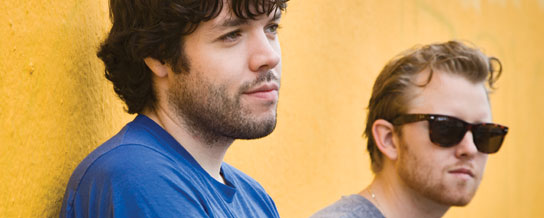Labels We Love: Bersa Discos
Every day this month we’re rolling out a new feature on XLR8R‘s Labels We Love […]

Labels We Love: Bersa Discos
Every day this month we’re rolling out a new feature on XLR8R‘s Labels We Love […]

Every day this month we’re rolling out a new feature on XLR8R‘s Labels We Love of 2009. Whether it’s the eye-catching aesthetics of Type or the model-for-the-future approach of Interdependent Media, these cut-making selections of the best in underground electronic, indie, hip-hop, and experimental imprints punch way above their weight. Feast your eyes on the features and then download many of the labels’ related podcasts here.
Two Californian cumbia nueva princes return from Argentina with guns a-blazin’.
The Latin American folk music known as cumbia first emerged as the accompaniment to a courtship dance performed by early 19th-century African slaves in Colombia. Over the years that followed, it became everything from the party soundtrack of the lower social classes to an international pop phenomenon and chart-topper in South and Central America.
Its most distinguishable feature is an Afro-Latin 4/4 rhythm augmented with a scraping or shaking sound created by rubbing a stick across the a traditional instrument called a güiro. But today’s cumbia nueva producers tend to generate those sounds electronically, and then weave them into a storm of sizzling synths and chunky, 808 basslines. In other words, this is not your abuela’s cumbia.
“There are some really crazy variations,” says Shawn Reynaldo (a.k.a Disco Shawn), a seasoned Bay Area DJ and co-founder of the two-year-old Bersa Discos label. (Full disclosure: Reynaldo is also an editor at XLR8R, but his involvement with Bersa Discos and his nose for next-level sounds was half the reason we hired him.—Ed.) “One style is called cumbia rebajada, where the music is pitched way down on purpose, so it gets super-heavy and almost psychedelic…but it’s not exactly dancefloor-friendly.”
Bersa Discos’ releases chop and splice vintage crate-digger cumbias with anything from hip-hop beats to dancehall to dubstep. Yet, considering Reynaldo’s current place in the cumbia nueva scene, he knew relatively little about the genre before 2006, when he moved to Buenos Aires, Argentina with thoughts of discovering a fresh crop of post-post-punk and noise bands. Instead, he stumbled upon cumbia after befriending his now-L.A.-based Bersa Discos co-founder Gavin Burnett (a.k.a. Oro11) at the urging of mutual friends in the band Lemonade.
Burnett had been living in Buenos Aires for five years and got into cumbia by DJing underground parties with Zizek Urban Beats Club, a small gathering of local DJs and producers that became a weekly club night shortly before Reynaldo arrived. Reynaldo was also invited to DJ at Zizek, and, like Burnett, began integrating more and more cumbia into his own sets.
“A lot of our friends down there just swapped MP3s, but no one was really distributing [cumbia nueva],” Burnett explains. With this in mind, the two Bay Area ex-pats founded Bersa Discos (a combination of the name of an Argentinean gun maker and the Spanish word for “records”), which was initially a home for other Buenos Aires-based producers like El Hijo de la Cumbia and Daleduro. Reynaldo and Burnett have since opened up their roster to include other international players like Brooklyn’s Uproot Andy, the Netherlands’ Sonido del Principe, and Mexico’s Toy Selectah, who is responsible for the label’s recent Bersa Discos #5 EP. The Bersa gents also promote their own cumbia-inspired monthly party, Tormenta Tropical, in both Los Angeles and San Francisco, and they expect to release #6, featuring Sabo (founder of the Sol Selectas label and manager of Turntable Lab’s New York shop) in the months to come, to be followed by new material from Montreal-based El Nosotros and Burnett himself.
But for as forward-thinking as Bersa Discos’ founders are, they have no illusions about the reach of their new spin on an old style. “What we’re doing is just one of the countless ways [cumbia] has mutated over the years,” says Reynaldo. “This is part of a much larger global trend. All over the world, people in third-world countries are gaining access to technology and the same bedroom producer phenomenon is repeating itself. People are taking sounds they’re familiar with, cutting them up, and making something new.”
Photo Mathew Scott

